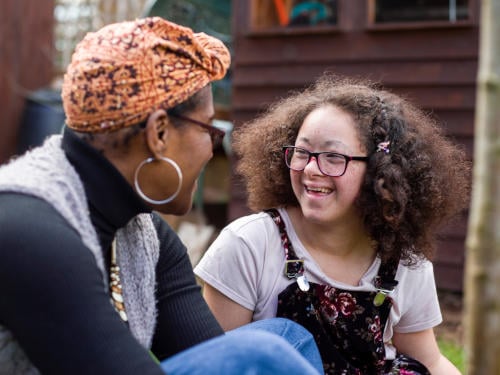As parents strive to give their children tools to carve out positive friendships and social skills, it is helpful to remember that children with SEND (Special Educational Needs and Disabilities), such as Down Syndrome, may need extra support.
Whilst children with Down Syndrome can develop great social skills and friendships, it can be useful to look at ways to help a child with this SEND to manage their social world.
SEND website, “Special Strong”, summarised the social issues a child with Down Syndrome may face into four categories: “Understanding Social Cues, Maintaining Conversations, Managing Emotions and Social Integration”.
Evaluating these four categories one by one, we can look more closely at ways to help your child adopt positive social skills and friendships:
Understanding Social Cues

- Firstly, teach your child to recognise social cues, such as facial expressions, body language, and tone of voice.
- Describe the signs; instead of saying “she looks upset”, you could say, “look, her eyes are watery, and her mouth is downward.”
- Start with expressions that represent “happy” and “sad”, before exploring other emotions such as “confusion” or “anger.”
- Social stories are a visual way to highlight different social cues. Chat about the story; maybe role-play some of the scenarios between you and your child, or factoring in a soft toy as a character.
Maintaining Conversations

- Teach an understanding of expectations during a conversation, such as eye contact and taking turns.
- Build a child’s word bank. Flashcards and labelling objects around the home can help.
- Discuss their topics of interest to build confidence and an enthusiasm to talk.
- Read with illustrations to explore new vocabulary. Ask questions about the images.
- Encourage chat; avoid questions where the response is a simple “yes” or “no”.
- Include close family/friends to gain more conversational practice.
- A speech therapist may help you to focus on any language delays.
Managing Emotions

- Discuss how you both manage feelings. Present a situation and examine how it could be handled.
- Note situations or sensory issues that typically trigger your child’s emotions – gently discuss them.
- Read books about feelings; this can provide a safe way to explore further.
- Teach your child to breathe deeply when exhausted or anxious. Create positive phrases so that your child can talk themselves through an emotional period, such as, “This will soon pass”.
- Sensory support, such as a teddy or squeeze toy may help comfort your child when upset. They may also need a safe space to sit and regroup.
- Social integration can be boosted by joining inclusive groups to mix with other children, for example local library activities, or toddler groups.
- Playdates with children, (with or without SEND), allows for focused interaction in a small environment.
- Teach specific skills, such as how to share and solve disagreements.
Sheree has worked as a Specialist SEND Tutor with children who have Down Syndrome. Having worked face-to-face in a tuition centre for both neurotypical and neurodivergent children, she states that friendships can be carved successfully if you create the right environment for all students.
Within the centre, Sheree worked alongside two children with Down Syndrome. She explains how strategies at the centre were very varied: “We used visuals, schedules and lots of play. We included their interests into conversations which helped them talk and become more confident.” With one of her pupils, Hitesh, 8 years old, Sheree noted a surge in his speech, a rise in his self-esteem and in his ability to interact with other children.
“Children were all taught about rules and mutual respect. My two pupils with Down Syndrome were a huge part of this and learnt how to interact, and how to cope with a disagreement. I firmly believe that by creating a holistic atmosphere where children are respected and learn about empathy, they can learn to successfully interact with others and make friends.”
“As well as school, it also helps to take your child into smaller group situations elsewhere in their social life, such as local classes where children can take the skills they have learnt in school and use them elsewhere.”
Sheree additionally worked with Down Syndrome children in a secondary mainstream school, where she also witnessed the successful mingling and blossoming of friendships among children with SEND as well as with neurotypical children.
“The main indicator is the set-up. If children are guided well in a safe space where rules are established, and shown how to behave clearly via modelling techniques, it gives them a precedent to follow. Issues that arise can be resolved within the safety of the space. This is achievable within a small or a larger situation as long as the foundation is clearly set, and a student feels cared for.”
When finding a route to help your child socially, remember that you don’t have to go it alone. Reach out to other professionals; talk to close friends or join social media groups with like-minded parents to share thoughts.
It is always important to note that children with Down Syndrome present with varying abilities. As such, improvements in social skill awareness can vary. However, if a secure setting is created, your child’s confidence could increase as they are given an opportunity to become empowered motivators of their social world. As you witness progress in your child, you too can be empowered, knowing that you helped to facilitate the changes.
Please note: The information provided within this blog, by SENsational Tutors, is for general information purposes only. We appreciate that every person is unique and any advice/experiences mentioned within the content of each blog may not be reflective of your own personal experience. All information on the site is provided in good faith and is for educational informational purposes only. It is not a substitute for professional advice. Before taking any actions based upon such information, we encourage you to consult with appropriate professionals.




